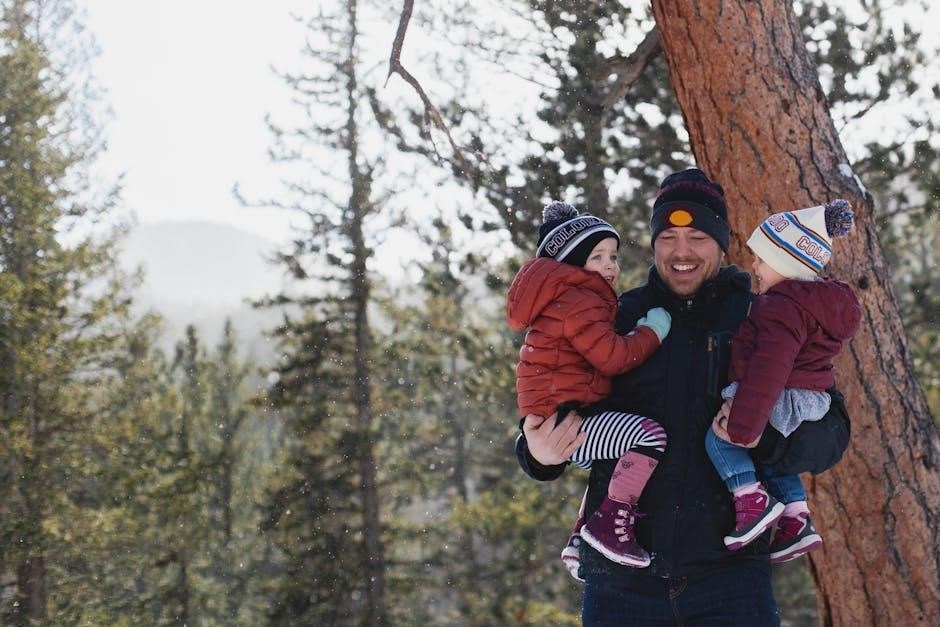A quitclaim deed in Colorado transfers property ownership without guarantees, offering a simple way to transfer property between parties, often used in family transactions or legal settlements.
1.1 Overview of Quitclaim Deeds
A quitclaim deed is a legal document transferring property ownership in Colorado without warranties. It conveys the grantor’s interest, if any, to the grantee, making it ideal for family transfers or legal settlements. While it lacks guarantees about property title, it offers simplicity and efficiency for straightforward transactions. Proper notarization and recording are essential to ensure its validity and enforceability under Colorado law.
1.2 Importance of Understanding Quitclaim Deeds in Colorado
Understanding quitclaim deeds in Colorado is crucial for ensuring legal validity and protecting rights. These deeds are commonly used in family transfers, divorces, or gifting property. Proper execution, including notarization and recording, is essential to avoid disputes. Misunderstandings can lead to legal complications, making it vital to seek professional guidance when preparing and filing a quitclaim deed in Colorado.
What is a Quitclaim Deed in Colorado?
A quitclaim deed in Colorado is a legal document that transfers property ownership without guarantees, offering a simple and straightforward way to convey property rights.
2.1 Definition and Purpose
A quitclaim deed in Colorado is a legal document that transfers ownership of real property from one party to another. It conveys whatever interest the grantor currently holds, without warranties. Its primary purpose is to transfer property rights efficiently, often used in non-traditional transactions like family transfers or legal settlements, providing a straightforward method to resolve ownership issues without extensive legal protections.
2.2 Key Features of a Quitclaim Deed

A quitclaim deed is a straightforward document that transfers the grantor’s current interest in a property without warranties. It does not guarantee against encumbrances or prior claims. The deed requires notarization to validate the grantor’s signature and must be recorded with the county clerk to establish public record. It is commonly used for transfers between family members or in legal settlements, offering a quick and efficient way to resolve property ownership issues.
When to Use a Quitclaim Deed in Colorado
Quitclaim deeds are ideal for transferring property between family members, resolving divorce settlements, or gifting property, offering a straightforward method without guaranteeing property title clarity.
3.1 Transferring Property Between Family Members
Quitclaim deeds are commonly used to transfer property between family members, such as parents transferring ownership to children or between siblings. This method is efficient for intra-family transactions, as it avoids lengthy legal processes. It allows for the quick transfer of property without warranties, making it a popular choice for maintaining family harmony and simplifying estate planning. The process is straightforward and cost-effective.
3.2 Divorce and Property Settlements
Quitclaim deeds are often used in divorce proceedings to transfer property ownership between spouses as part of a settlement. This method allows one spouse to relinquish their claim to the property quickly and efficiently. It is a common way to finalize property division without warranties, making it a practical solution for uncontested cases. The deed simplifies the legal process, ensuring a smooth transfer of ownership during divorce proceedings.
3.3 Gifting Property

Quitclaim deeds are a straightforward method for gifting property in Colorado. They allow the grantor to transfer their interest without warranties, making them ideal for simple, non-commercial transfers between family or friends. This deed is particularly useful for gifting property as it avoids the complexities of a formal sale. However, the grantee should be aware that they may inherit any existing liens or issues associated with the property. Recording the deed ensures the transfer is legally recognized, providing clarity and security for both parties involved.

How to Create a Quitclaim Deed in Colorado
Creating a quitclaim deed in Colorado involves preparing the document with property details, grantor-grantee information, and a legal description, followed by notarization and recording.
4.1 Preparing the Deed
Preparing a quitclaim deed in Colorado involves including the property’s legal description, names of the grantor and grantee, and a statement transferring ownership. Ensure all details are accurate to avoid legal issues. The deed must be typed or printed clearly, with spaces for signatures and notarization. It’s crucial to use the correct legal language to maintain validity under Colorado state law.
4.2 Notarization Requirements
In Colorado, a quitclaim deed must be notarized to validate the grantor’s signature. The notary public verifies the grantor’s identity and ensures they sign voluntarily. Personal appearance is typically required. The notary affixes their seal and signature, confirming the authenticity of the document. This step is crucial for preventing fraud and ensuring the deed’s legal enforceability. Proper notarization is a legal requirement for recording the deed in Colorado counties.
4.3 Recording the Deed
After notarization, the quitclaim deed must be recorded with the Recorder’s office in the Colorado county where the property is located. Submit the original deed, along with any required fees, to ensure it becomes part of public records. Recording provides legal notice of ownership transfer, protecting the grantee’s rights. The process typically includes filing the deed and paying a recording fee, which varies by county. Timely recording is essential for validity.
Notarization Process for Quitclaim Deeds in Colorado
The notary public verifies the signer’s identity and witnesses the signature. The deed must be signed in the notary’s presence, who then affixes their seal.
5.1 Role of a Notary Public
A notary public verifies the identity of the signer, ensures they sign voluntarily, and witnesses the signature. This ensures the authenticity and legality of the quitclaim deed, preventing fraud.
5.2 Requirements for Notarization
To notarize a quitclaim deed in Colorado, the signer must appear before a notary public with a valid photo ID. The notary verifies identity, ensures the signature is voluntary, and witnesses it, then applies their official seal. This process maintains the document’s legality and authenticity, preventing fraud.
5.3 Out-of-State Notarization Options
Colorado allows out-of-state notarization of quitclaim deeds, enabling signers to complete the process remotely. This is particularly useful for individuals unable to visit Colorado in person. Notaries from other states can legally notarize documents intended for recording in Colorado, ensuring the deed’s validity and compliance with state regulations. This flexibility streamlines the process while maintaining legal integrity.

Recording the Quitclaim Deed in Colorado
Recording a quitclaim deed in Colorado finalizes the property transfer, making it part of the public record. It ensures legal recognition, resolves disputes, and aids in tax assessments. The deed, once notarized, must be submitted to the county recorder’s office where the property is located. This step is crucial for validating the ownership transfer and maintaining official records.
6.1 Importance of Recording
Recording a quitclaim deed in Colorado is essential for legal recognition of ownership transfer. It prevents disputes by making the transaction public record, ensuring transparency and validity. Without recording, the deed remains unverified, potentially leading to legal complications. Recording safeguards property rights, provides official documentation, and aids in tax assessments. It ensures the transfer is enforceable under Colorado law, offering protection for both parties involved in the transaction.
6.2 Steps to Record the Deed
To record a quitclaim deed in Colorado, prepare the deed with accurate property details and signatures. Ensure it is notarized as required. Submit the deed to the county clerk and recorder’s office where the property is located. Pay the applicable recording fees. Once processed, the deed is recorded, providing public notice of the ownership transfer and ensuring legal validity of the transaction.
6.3 Fees Associated with Recording
Recording fees for a quitclaim deed in Colorado vary by county but typically range from $10 to $30 per page. Additional fees may apply for oversized documents or multiple pages. Contact the county clerk and recorder’s office where the property is located for the exact cost. Payment is usually required at the time of submission to complete the recording process.

Legal Implications of a Quitclaim Deed in Colorado
A quitclaim deed in Colorado transfers property rights without warranties, potentially leading to unforeseen liabilities for the grantee. Understanding the legal implications is crucial for all parties involved.

7.1 Rights and Liabilities
In Colorado, a quitclaim deed transfers the grantor’s interest in the property “as-is,” without warranties. The grantor retains no liability post-transfer, while the grantee assumes all risks, including potential undisclosed liens or ownership claims. This “as-is” nature means the grantee could face legal or financial consequences if issues arise, emphasizing the importance of due diligence and legal advice before accepting such a deed.
7.2 Potential Risks
A quitclaim deed in Colorado carries risks, as it lacks warranties, meaning the grantor may transfer unknown liens, debts, or ownership disputes. The grantee assumes all liabilities, potentially facing financial losses or legal battles if issues arise. Without legal protections, the grantee could lose rights to the property, making it crucial to ensure the title is clear before accepting a quitclaim deed.
7.3 Tax Considerations
A quitclaim deed in Colorado may trigger property tax reassessments, potentially increasing taxes for the grantee. Tax implications vary based on the relationship between parties and the property’s value. Gifting property may qualify for exemptions, while other transfers could lead to capital gains. Consulting a tax professional is essential to navigate these complexities and ensure compliance with Colorado tax laws.

Finding a Quitclaim Deed Form in Colorado
Quitclaim deed forms in Colorado can be found online, through legal websites, or at county offices. Ensure the form is valid for Colorado and meets local requirements.
8.1 Sources for Quitclaim Deed Forms

Quitclaim deed forms in Colorado can be sourced from legal websites, county assessor or recorder offices, or online platforms like Rocket Lawyer or LawDepot. Ensure the form is state-specific and complies with Colorado laws. Additionally, local legal aid organizations or real estate attorneys may provide validated templates. Always verify the form’s authenticity and completeness before use to avoid legal issues.
8.2 Ensuring the Form is Valid in Colorado
To ensure a quitclaim deed form is valid in Colorado, it must comply with state laws, including proper notarization by a Colorado-licensed notary public. The form should adhere to the Colorado Revised Statutes governing real estate transactions. It’s crucial to verify that the document includes all required elements, such as property description, grantor and grantee details, and signatures. Consulting a real estate attorney can help confirm the form’s validity and ensure compliance with local regulations.

8.3 Using Online Templates
Online templates for Colorado quitclaim deeds offer convenience and cost savings. Many websites provide downloadable PDF forms tailored to Colorado laws. When using these templates, ensure they include all necessary sections, such as property description, grantor/grantee details, and signature lines. While online templates can streamline the process, it’s advisable to consult a legal professional to verify accuracy and compliance with state requirements before finalizing and notarizing the document.
Understanding quitclaim deeds in Colorado is crucial for smooth property transactions. They offer a straightforward way to transfer ownership, particularly in family or divorce situations. While online templates simplify the process, consulting a legal professional ensures compliance and avoids pitfalls. Proper notarization and recording are essential for validity. By following the steps and seeking expert advice, individuals can efficiently and securely transfer property rights, minimizing future disputes and ensuring a seamless process for all parties involved.